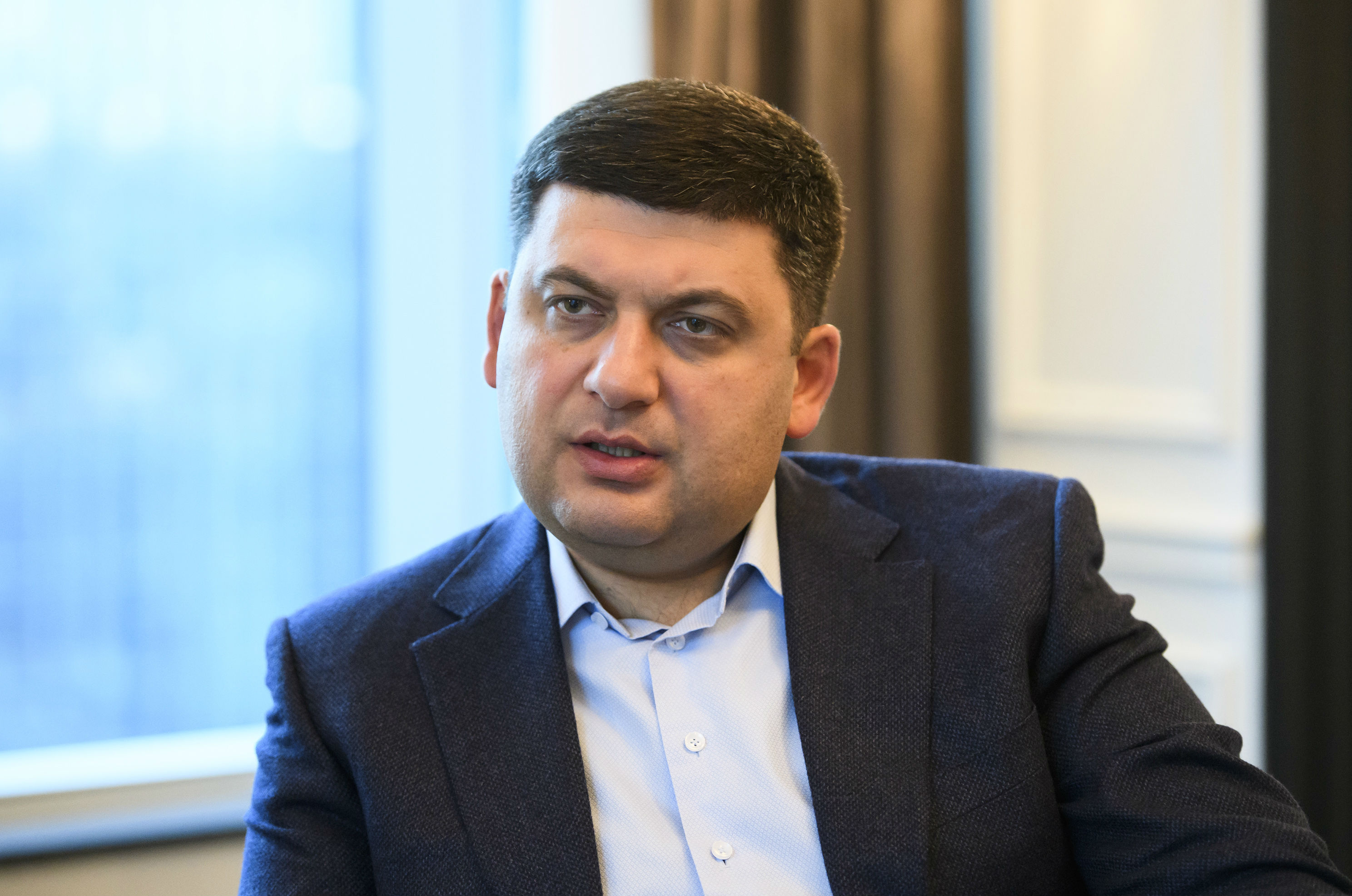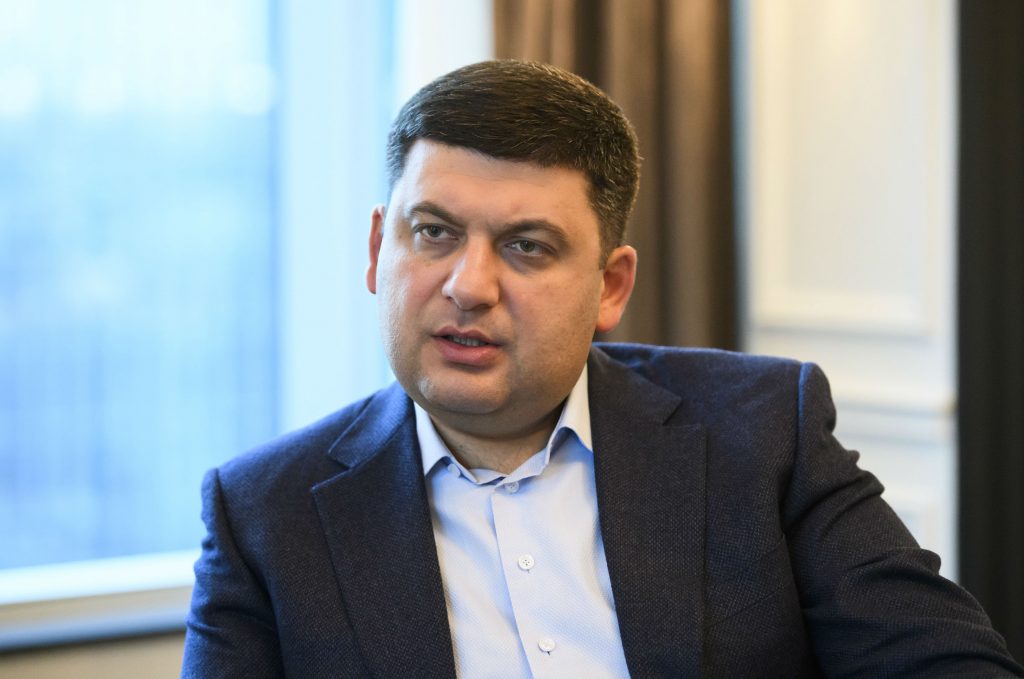 Prime Minister Volodymyr Groisman welcomes the creation of an independent anticorruption court in Ukraine and says it will be operating in 2018.
Prime Minister Volodymyr Groisman welcomes the creation of an independent anticorruption court in Ukraine and says it will be operating in 2018.
“The debate was whether this court should be independent or a chamber. This was a waste of time,” he said in an extensive interview in Toronto. “From day one, I was in support of an independent anticorruption court.”
He said he has added the cost of the independent court to his budget for next year and has assurances from President Petro Poroshenko this will be a priority.
A “holistic system” is needed to eradicate corruption which includes the National Anticorruption Bureau of Ukraine, the anticorruption court, along with other reforms.
“We lost a lot of time and laws must be adopted to provide for judicial independence,” he said.
Ukraine’s broken justice system is to blame for the fact that in three years former President Viktor Yanukovych and his accomplices have not been charged or the stolen money recuperated in full.
“I want to see justice like the majority of Ukrainians do,” he said. “[Yanukovych] should be held responsible for the deaths of the Heavenly Hundred and for undermining the country.” He said the prosecutor general is investigating and in April Ukraine began to seize $1.5 billion of the funds Yanukovych allegedly stole.
The last three years have been tumultuous due to the Russian invasion and the country’s economic collapse but even so significant reforms have taken place, he said.
In October, the Helsinki Commission’s study on corruption in Ukraine itemized the major government actions that have eliminated predation such as the restructuring of Naftogaz and the natural gas market; new drug procurement procedures; fraud-proof VAT collection; and the creation of the Prozorro procurement platform.
Other accomplishments have been health reform, recently passed in the Rada and fully backed by Groisman, as well as education and pension reforms, just implemented.
Next, he believes privatization will transform the economy. But I ask will Ukraine implement anti-trust reforms in order to prevent the oligarchs from buying everything?
“There is no place for monopolies in the broad sense,” he said. “De-monopolization is on our agenda.”
He said privatization will reform the economy if done properly. “In our draft to parliament we are talking about foreign bids and domestic ones, transparency, and proper privatization contracts governed by London arbitration.”
The country’s reform agenda has been ambitious, but not rapid enough for many foreign investors. For instance, Groisman took questions at a Toronto conference and one businessman complained about being asked to make bribes for licenses and permits all the time.
“You must file a complaint. This is not allowed,” he said.
Groisman is conscious of these challenges. Recent incidents with Dragon Capital and French pharma giant Sanofi operating in Ukraine involve the SBU or judiciary. He said a new law will address rogue behavior.
“Incidents that damage our reputation are very important to address,” he said.
“We have a new law, with the president’s agreement, that police will not investigate economic crimes. This will be done by financial investigators, NABU, and the anticorruption court. Such investigations will no longer be done by any member of the existing public service or law enforcement.”
When asked about SBU harassment of the Anti-Corruption Action Center and other non-profit organizations, he said he had “zero tolerance” for this.
I asked Groisman about the status of the war with Russia and recent terrorist activities in Kyiv, including the attempted assassination last week of a member of parliament.
“Unfortunately, this is not only happening in Ukraine and we have been undertaking strong preventative measures,” he said.
He also said the government has “great hopes” that Canada and the United States will provide lethal defensive weapons so that Ukraine can better defend itself. Canadian Prime Minister Justin Trudeau has agreed, in concert with the United States, and US Special Envoy to Ukraine Kurt Volker has said the administration is “seriously considering” sending such weapons.
“This is a mandatory element to de-escalate the situation,” said Groisman. He also believes that the fact that Canada is chairing the G7 next year may help push this initiative.
“The Russians will have fewer opportunities to attack if we have such weapons in our possession,” he said. “These weapons will be used as a deterrent, not used for [an] attack.”
Despite the terrible losses in human and economic terms, Groisman said Ukrainians are more resolved than ever to rebuild the country.
“[The Russians] thought they would conquer us easily in 2014 and destabilize us, but they have failed,” said Groisman.
Despite all the difficulties, he says that within five years Ukraine’s living standards will have improved, the economy will be stronger, the European Union association agreement will be implemented, energy independence will have been reached, and the country’s territorial integrity will be intact.
“And I hope we will see positive birthrates,” he said adding a new metric of success. “People have children if they are certain of their future. That’s what I’d really like to see. Then we will be on our way.”
Diane Francis is a Senior Fellow at the Atlantic Council’s Dinu Patriciu Eurasia Center, Editor at Large with the National Post in Canada, a Distinguished Professor at Ryerson University’s Ted Rogers School of Management, and author of ten books.
Image: Ukraine Prime Minister Volodymyr Groisman speaks with UkraineAlert in Toronto on October 29. Credit: Vladyslav Musiienko

